Susan Bernofsky's Blog, page 46
January 13, 2015
Translation on Tap in NYC, Jan. 16 – 31, 2015
Here’s what’s coming up in Translationland:
Saturday, Jan. 17:
Why Retranslate the Classics? Panel discussion to celebrate the 4th anniversary of Asymptote Journal, with the great Edith Grossman talking about her retranslation of Don Quixote, Translationista talking about her ditto of The Metamorphosis, Damion Searls and Tara FitzGerald, moderator. This is a ticketed event (fundraiser), details here. To be held at Tishman Auditorium at The New School, 66 W. 12th St., 6:30 p.m.
Thursday, Jan. 22:
Writing Across Borders and Languages, a conversation with bilingual Italian-Algerian author Amara Lakhous, who will be speaking, among other things, about bilingual writing and (self-)translation. East Gallery, Buell Hall, Columbia University. More information here. 6:00 p.m.
Thursday, Jan. 29:
 A Celebration of Silvina Ocampo to toast the appearance of two books by the late great Argentine writer (and Borges buddy): Thus Were Their Faces (short fiction) and Silvina Ocampo (poems). The event features translators Jason Weiss, Esther Allen, Daniel Balderston, and Yvette Siegert discussing Ocampo’s life and work. Event details here. The Community Bookstore, 143 Seventh Ave. in Brooklyn, 7:00 p.m.
A Celebration of Silvina Ocampo to toast the appearance of two books by the late great Argentine writer (and Borges buddy): Thus Were Their Faces (short fiction) and Silvina Ocampo (poems). The event features translators Jason Weiss, Esther Allen, Daniel Balderston, and Yvette Siegert discussing Ocampo’s life and work. Event details here. The Community Bookstore, 143 Seventh Ave. in Brooklyn, 7:00 p.m.
The post Translation on Tap in NYC, Jan. 16 – 31, 2015 appeared first on TRANSLATIONiSTA.
An Officer and a Translator
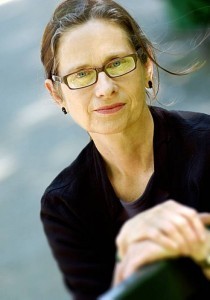 This is just a little post to note that the great Lydia Davis, whose translations (e.g. Madame Bovary, Swann’s Way, etc.) are as luscious as her own fiction writing, is about to be named an Officier of the French Order of Arts and Letters by Cultural Counselor of the French Embassy Antonin Baudry, in a closed ceremony in New York on Jan. 15, 2015. They can’t knight her, because she was already named a Chevalier back in 1999 for her translations of Michel Leiris, Emmanuel Hocquard, Jean-Pierre Jouve, Maurice Blanchot, and Françoise Giroud. If I have understood the fine points of the highly complex system of French honorifics correctly, to be named an Officier is even a higher honor than knighthood. All these titles sound odd when applied to a woman, of course (yes, I assume that wasn’t in the original plan). Apparently the (British) female form of “sir” (for knights) is “dame” (for lady knights). “Dame Officer Davis” doesn’t sound quite right in either English or French, but if you get the accent right on “chevalier et officier,” you’ll be in good shape to congratulate this splendid writer and translator when you see her next.
This is just a little post to note that the great Lydia Davis, whose translations (e.g. Madame Bovary, Swann’s Way, etc.) are as luscious as her own fiction writing, is about to be named an Officier of the French Order of Arts and Letters by Cultural Counselor of the French Embassy Antonin Baudry, in a closed ceremony in New York on Jan. 15, 2015. They can’t knight her, because she was already named a Chevalier back in 1999 for her translations of Michel Leiris, Emmanuel Hocquard, Jean-Pierre Jouve, Maurice Blanchot, and Françoise Giroud. If I have understood the fine points of the highly complex system of French honorifics correctly, to be named an Officier is even a higher honor than knighthood. All these titles sound odd when applied to a woman, of course (yes, I assume that wasn’t in the original plan). Apparently the (British) female form of “sir” (for knights) is “dame” (for lady knights). “Dame Officer Davis” doesn’t sound quite right in either English or French, but if you get the accent right on “chevalier et officier,” you’ll be in good shape to congratulate this splendid writer and translator when you see her next.
The post An Officer and a Translator appeared first on TRANSLATIONiSTA.
January 8, 2015
Apply now for the 5th Biannual Graduate Student Translation Conference
 The Biannual Graduate Student Translation conference is a splendid tradition dreamed up by Michael Henry Heim and launched in 2004 at UCLA; additional iterations of the conference (generally staged more than two years apart, alas) have since taken place at Columbia University, the University of Iowa and, most recently, the University of Michigan, Ann Arbor (in 2010, with Translationista as keynote speaker). Now the 5th Biannual
Graduate Student Translation Conference has been announced, to be held May 8-9, 2015, once again at the University of Michigan, with the brilliant Sean Cotter giving the keynote.
The Biannual Graduate Student Translation conference is a splendid tradition dreamed up by Michael Henry Heim and launched in 2004 at UCLA; additional iterations of the conference (generally staged more than two years apart, alas) have since taken place at Columbia University, the University of Iowa and, most recently, the University of Michigan, Ann Arbor (in 2010, with Translationista as keynote speaker). Now the 5th Biannual
Graduate Student Translation Conference has been announced, to be held May 8-9, 2015, once again at the University of Michigan, with the brilliant Sean Cotter giving the keynote.
At the heart of the conference are the thematically-organized six-member workshops for graduate students translating into English from any language. Participants read and critique each others’ translations. Spots in the workshop are competitive, and applications are due soon, so please get ready to submit your work by February 1, 2015. Applications include 5-10 translated poems or 5-10 pages of prose, a scan of the original, a one-page statement on “your motivations for translating the text and specific challenges it presents the translator” and a CV. All applications to be submitted by email here. Submit any questions to that address as well.
The conference will also feature several roundtables with an emphasis on translation practice, staffed with professionals in the field. I hear publisher/editor Chad Post of Open Letter Books is already confirmed as a speaker.
The conference organizers are prepared to help graduate students visiting for the conference find local accommodations. There is also the possibility of limited financial assistance to applicants unable to secure travel funding from their home institutions. Inquire here.
I’m thrilled that this excellent tradition is being continued; let’s do what we can to make the biannual conference biannual again.
The post Apply now for the 5th Biannual Graduate Student Translation Conference appeared first on TRANSLATIONiSTA.
January 5, 2015
Translation on Tap in NYC, Jan. 1 – 15, 2015
 Happy new year, everyone! I’m looking forward to sharing another year of excellent translation events with you. Here’s what we’ve got to start us out:
Happy new year, everyone! I’m looking forward to sharing another year of excellent translation events with you. Here’s what we’ve got to start us out:
Tuesday, Jan. 6:
The Art of Literary Translation: How Meaning Translates Across Languages, with PEN Translation Committee Co-Chair and National Translation Award winner Alex Zucker and Julia Livi, author of the bilingual children’s book series Voltaire: The Franco-American Hipster Dog. This even is being hosted by Fluent City, an after-work language program for adults. More information here. Word Books, 126 Franklin St, Brooklyn, 7:00 p.m.
Tuesday, Jan. 13:
Here’s an event in German: Czech-born Austrian author and translator Zdenka Becker reading from her new novel, Der grösste Fall meines Vaters, and speaking with translator (and FnL curator!) Tess Lewis. More information here. NYU Deutsches Haus, 42 Washington Mews, 6:30 p.m.
The post Translation on Tap in NYC, Jan. 1 – 15, 2015 appeared first on TRANSLATIONiSTA.
January 4, 2015
Translation at the 2015 MLA
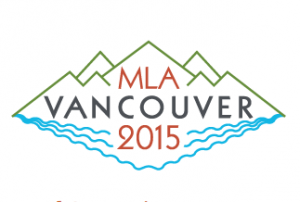 Translationista won’t be at the Modern Language Association’s annual convention this year, even though it’s the 5th anniversary of the legendary 2009 convention in which then MLA President Catherine Porter declared the master theme of the convention “The Tasks of Translation in the Global Context.” Fortunately a number of my translator colleagues will be attending, including Heather Cleary (among other things, a founding editor of the Buenos Aires Review), who kindly agreed to provide a listing of the most interesting translation-themed events being presented this year. The convention this year is entitled “Negotiating Sites of Memory” and will take place Jan. 8 – 11 in Vancouver. It looks like a great line-up. Here are Heather’s suggestions:
Translationista won’t be at the Modern Language Association’s annual convention this year, even though it’s the 5th anniversary of the legendary 2009 convention in which then MLA President Catherine Porter declared the master theme of the convention “The Tasks of Translation in the Global Context.” Fortunately a number of my translator colleagues will be attending, including Heather Cleary (among other things, a founding editor of the Buenos Aires Review), who kindly agreed to provide a listing of the most interesting translation-themed events being presented this year. The convention this year is entitled “Negotiating Sites of Memory” and will take place Jan. 8 – 11 in Vancouver. It looks like a great line-up. Here are Heather’s suggestions:
The MLA convention starts this week, which means that right now many of us are probably scrambling around, trying to figure out which events to attend and how many cups of coffee we can safely drink in one day. To help with these calculations, here are some of the best and brightest among the scheduled panels on translation:
Friday, January 9
355. Translation and the MLA: Five Years Later
3:30–4:45 p.m., 15 VCC East
A discussion of the evolving relation between translation and the MLA, five years after Catherine Porter’s presidential theme, “The Tasks of Translation in the Global Context.” Perspectives on the place of translation studies, translation theory, and literary translation in academia. Presentations on current research, recent publications and developments in the field, and challenges and possible actions for the future.
With Esther Allen, Emily S. Apter, Sandra L. Bermann, Sean J. Cotter, Catherine Porter, and Shaden M. Tageldin; moderated by Sergio Waisman.
380. Translation and Interpreting: Flexible Career Paths in Vulnerable Times
5:15–6:30 p.m., 13 VCC East
In addition to academic research and publications, translation and interpreting are relevant as part-time consulting work for a full-time faculty member and as a full-time or part-time career for university students. This roundtable focuses on career options and the relevant skills needed.
Saturday, January 10
498. Fragments of a Vessel: Translation and Memory
12:00 noon–1:15 p.m., 121 VCC West
In collaboration with the PEN America Translation Committee, this roundtable explores sites of cultural recovery and reinvention by joining political, linguistic, and aesthetic reflections on translation with a discussion of its role as both a repository and vehicle of cultural memory.
With Suzanne Jill Levine, Bella Brodzki, Sinan Antoon, and Mara Faye Lethem; moderated by Mary Ann Newman and Heather Cleary
Sunday, January 11
687. Beyond Monolingualism?
10:15–11:30 a.m., 17 VCC East
An exploration of the contingent foundations of the monolingual paradigm in literary studies, the reemergence of multilingualism, and their relation with translation.
With Caterina Bernardini, Mrinalini Chakravorty, Avishek Ganguly, Jonathan H. Hsy, Anjuli Kolb, and Yasemin Yildiz; moderated by Avishek Ganguly.
Responding: Gayatri Chakravorty Spivak
762. Bilingual Authors and Literary Self-Translation
1:45–3:00 p.m., 14, VCC East
Approaches to the topic include Hangping Xu’s “Theorizing Self-Translation: Lin Yutang, Eileen Chang, and United States–China Transnational Politics,” Brandon Rigby’s “Between Language and Self: Interliminality in Self-Translated Bilingual Poetry,” and Joanie Crandall’s “The Self-Translation of David Bouchard: Texts Composed through the Subjectivities of Multiple Lenses.”
Responding: Sergio Waisman; moderated by Giada Biasetti.
This is just a sample of the panels on translation scheduled for this year’s MLA convention; a complete list can be found here… and for the truly brave among you, the full program is available (and searchable) here.
See you in Vancouver!
The post Translation at the 2015 MLA appeared first on TRANSLATIONiSTA.
December 22, 2014
Michael Henry Heim Translation Prize
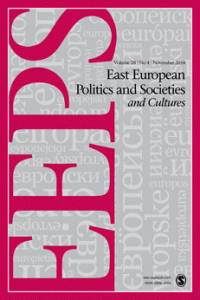 This is the inaugural year of the Michael Henry Heim Translation Prize, founded to honor the great translator and translation activist, and to promote his idea of “collegial translation,” encouraging scholars in a range of social science fields to seek some training in translation, making them able to translate their international colleagues’ work. Of course, professional literary translators are generally equipped to translate work on various topics, but in many fields specialized terminology is used, and a full understanding of crucial contexts and controversies may not be immediately transparent to an outsider, even one who “studies up.” In 2006, Heim co-authored the American Council of Learned Societies’ Guidelines for the Translation of Social Science Texts, now available in several languages, as part of ACLS’s Social Science Translation Project.
This is the inaugural year of the Michael Henry Heim Translation Prize, founded to honor the great translator and translation activist, and to promote his idea of “collegial translation,” encouraging scholars in a range of social science fields to seek some training in translation, making them able to translate their international colleagues’ work. Of course, professional literary translators are generally equipped to translate work on various topics, but in many fields specialized terminology is used, and a full understanding of crucial contexts and controversies may not be immediately transparent to an outsider, even one who “studies up.” In 2006, Heim co-authored the American Council of Learned Societies’ Guidelines for the Translation of Social Science Texts, now available in several languages, as part of ACLS’s Social Science Translation Project.
The Heim Translation Prize is awarded annually by the journal East European Politics & Societies and Cultures (EEPS) for the best collegial translation of a journal article from an East European language into English. Awardees are selected based on the significance of the original work, the quality of the translation, and the contribution the translation is likely to make to dialogue across scholarly communities. The Prize Committee is composed of the journal’s editors and invited referees (experts in the subject matter, in the art of translation, or both). This year’s prize was just awarded to Jennifer Croft for her translation of Roma Sendyka‘s “Miejsca, które straszą (afekty i nie-miejsca pamięci)” (”Sites That Haunt: Affects and Non-Sites of Memory”). The award comes with a $500 prize and a copy of the 2014 book The Man Between: Michael Henry Heim & A Life In Translation. The winning article will be published in EEPS.
The deadline for next year’s competition is Sept. 1, 2015. Information on submitting a translation can be found here.
The post Michael Henry Heim Translation Prize appeared first on TRANSLATIONiSTA.
December 20, 2014
Hello Cuba
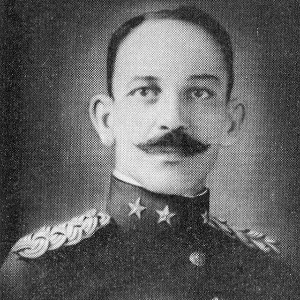
José Martí (1853 – 1895)
When I was a child growing up in New Orleans, Cuba appeared in my schoolbooks as a blank patch of water in the Gulf of Mexico. This rogue state avant la lettre was apparently too dangerous to have its existence revealed to the new generation growing up just an hour or two’s airplane ride away. The never-never-land status of the country – at least in the eyes of the non-military population of the U.S. – was certainly convenient when our government decided to build the Guantánamo Bay detention camp there far from any sort of civilian oversight. It was an open secret that the U.S. government had maintained a naval base in Cuba since 1903, including during all the years when it was asking us to disregard the country’s existence. Now that President Obama has announced a normalization of relations with Cuba, New Orleans is likely to become one of a handful of new gateways to the country, along with Miami and other Gulf Coast locations. Lest the novelty of travel to Cuba appear all too novel, keep in mind that Cuba has long been a popular tourist destination for travelers from around the globe, including American residents willing to accept the inconvenience and expense of traveling via Canada or Mexico to circumvent the U.S.’s travel ban. Under the new policy, I hope, Cubans will be allowed to visit the U.S. as well.
Back in 1881, the great poet, journalist and architect of Cuban independence José Martí traveled to the U.S., where he settled in New York and wrote extensively about both countries, their struggles and development. Generally considered the key intellectual figure behind the founding of the Cuban state, Martí died in battle in 1895 in one of the three wars fought for Cuban independence from Spain. It is no surprise that President Obama chose a line by Martí to begin the part of his Nov. 17 speech addressed directly to the Cuban people. Esther Allen, a scholar and translator of Martí who is currently writing a new biography of the Cuban hero, has traced the source and original context of that line, and has written about it, along with Martí’s role in the changing landscape of Cuban-U.S. relations, in a dispatch for Words Without Borders entitled “The New Normal: On Cuba and the Power of Translation.” Before you book your plane ticket, you can read what she has to say here.
The post Hello Cuba appeared first on TRANSLATIONiSTA.
December 16, 2014
Translation on Tap in NYC, Dec. 16 – 31, 2014
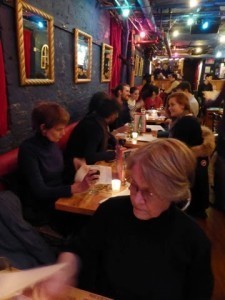 With the madness of the holiday season upon us, what better respite than a nice translation event? Here’s what’s I’ve heard about that’s coming up:
With the madness of the holiday season upon us, what better respite than a nice translation event? Here’s what’s I’ve heard about that’s coming up:
Thursday, Dec. 18:
This edition of French Night at the Cornelia will celebrate French Contemporary Gay and Lesbian Fiction, featuring Joseph Patrick Stancil reading from his translation of The Sleepworker by Cyrille Martinez, Lara Vergnaud reading from her translation of Standard by Nina Bouraoui, and several students from the NYU MA program in French-English literary translation reading from their group translation of Tranvestite/Travesti by David Dumortier. I hear some of the French writers may be there as well. At the Cornelia Street Cafe, 29 Cornelia St., more information here. 6:00 p.m.
The post Translation on Tap in NYC, Dec. 16 – 31, 2014 appeared first on TRANSLATIONiSTA.
December 9, 2014
Volunteer Translators Needed by Justice League NYC
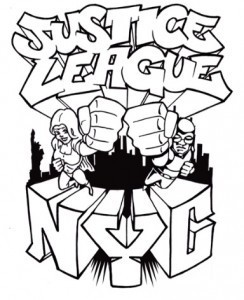 Justice League NYC is a New York based activist group currently working in New York on protesting the non-indictment of NYPD officer Daniel Pantaleo in the chokehold death of Eric Garner of Staten Island by coordinating peaceful protests and advocating a list of demands for redress and accountability. This group is an outgrowth of Gathering for Justice, a social justice organization founded in 2006 by Harry Belafonte. You can read more about their work here.
Justice League NYC is a New York based activist group currently working in New York on protesting the non-indictment of NYPD officer Daniel Pantaleo in the chokehold death of Eric Garner of Staten Island by coordinating peaceful protests and advocating a list of demands for redress and accountability. This group is an outgrowth of Gathering for Justice, a social justice organization founded in 2006 by Harry Belafonte. You can read more about their work here.
In a bid to bring more international awareness to the desperate situation in the United States in which we have seen a rash of killings of unarmed people by police officers without legal accountability, the Justice League is seeking translations into as many different languages as possible for use in publicizing their efforts to achieve meaningful reform. If you are able to help out by translating the following list of demands, please leave a note in the comments section below indicating your language and send your translation to the Gathering for Justice team with a copy to Translationista. If you are a professional translator, please indicate that in your response. And if you are able to use your own network to publicize the demands and the work of Justice League NYC, that helps the cause even more!
Here is the list of the Justice League NYC’s demands:
WE DEMAND THE FOLLOWING:
The immediate firing of Police Officer Daniel Pantaleo and all officers responsible for the death of Eric Garner.
The State of NY will appoint a Special Prosecutor to investigate and prosecute all criminal cases involving the use of force, including deadly force, by police officers, and in particular, immediately appoint a Special Prosecutor in the wrongful death of Eric Garner.
The City and State of New York will draft legislation to clarify the rules of engagement between the police and the community to make illegal the use of lethal force, including the chokehold, except to protect against serious, imminent physical injury to the police officers or the public.
NYC will create a comprehensive NYPD Training Program for ALL officers – to include crisis intervention, harm reduction and de-escalation skills – to eliminate racial bias and police brutality.
An immediate end to NYPD’s “Broken Windows” Policing, which overwhelmingly targets black and brown communities with aggressive quality of life policing and enforcement tactics that could escalate to excessive force as in the case of Eric Garner.
An end to the criminalization of young people in the NY school system. The “school-to-prison pipeline” targets primarily youth of color and has created a generation of youth growing up incarcerated. Mayor de Blasio made this a hallmark of his historic campaign, but has yet to adopt necessary reforms.
US Attorney General Eric Holder will expedite the federal investigation into the death of Eric Garner.
Immediate passage of the Right to Know Act.
NY State and all localities engage in complete transparency in regards to profiling, and search and seizure practices, and to provide all public data on other police practices including summonses, arrests and detention practices.
We call on Mayor Bill de Blasio, Governor Andrew Cuomo and NY Attorney General Eric Schneiderman to meet with Justice League NYC in order to explore all avenues to make viable the implementation of the above demands as immediately and efficiently as possible.
The post Volunteer Translators Needed by Justice League NYC appeared first on TRANSLATIONiSTA.
December 1, 2014
What I Learned at ALTA 2014
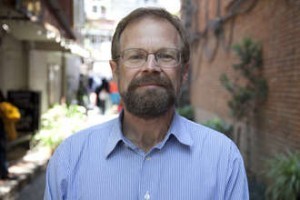 It’s been a busy two weeks since I got back from the 2014 ALTA Conference in Milwaukee, so I’m quite behind in blogging about some of the things I learned at this year’s annual meeting of the American Literary Translators Association. It was a particularly strong conference, with a number of panels I was excited about participating in and/or hearing. I arrived at the conference late, so missed both the ALTA Fellows‘ Reading (which I heard was the best ever) and the launch event for The Man Between: Michael Henry Heim & A Life in Translation. Here are some excerpts from my notes on the panels I attended:
It’s been a busy two weeks since I got back from the 2014 ALTA Conference in Milwaukee, so I’m quite behind in blogging about some of the things I learned at this year’s annual meeting of the American Literary Translators Association. It was a particularly strong conference, with a number of panels I was excited about participating in and/or hearing. I arrived at the conference late, so missed both the ALTA Fellows‘ Reading (which I heard was the best ever) and the launch event for The Man Between: Michael Henry Heim & A Life in Translation. Here are some excerpts from my notes on the panels I attended:
The Literary Translation Workshop: Best Practices
This is a panel I organized and moderated about teaching literary translation, figuring (correctly, it turns out) that I could pick up some pointers. Becka McKay offered “10 rules for making new translators” that included “make them believe in the necessity of translation,” “make them better readers” and “make them evangelists [for translation].” She has all her students create versions of some sort (open genre) of one of Ovid’s Metamorphoses (one student this year “translated” it into a cake). Leah Leone has her students read a novel translated from a language they don’t know and keep a journal as they read, writing down all the translation strategies they notice and noting which of them would also work for the language they translate from. What a great idea! Sean Cotter has found his students particularly responsive to/likely to be inspired by metaphors for translation having to do with physically embodying a text. Some of the readings he’s found most effective are Rosmarie Waldrop’s Lavish Absence, Anne Carson’s Nox, Pascale Casanova’s The World Republic of Letters, and Daniel’s Weissbort’s From Russian with Love. Aron Aji asks his students to write translator’s notes to accompany each of their workshop submissions (way to get them focused on strategy and craft!) and begins each workshop with a five-minute period in which anyone in the class can ask the translator questions, followed by a 40-minute workshop period in which the translator must remain silent. I think I’m going to try this in my workshop next semester, as a way to keep the workshop from turning into a conversation between the translator and everyone else (which is interesting, but not really what a workshop should be); explicitly compartmentalizing is a good way to address this, especially as it means that the other workshop participants know they’ll have to come prepared to ask the translator whatever questions they’ll have right at the outset. Oh, and Aron asks students to answer the question “why this work” in their translator’s notes. Sean, too, asks students to address this topic, in his case by making them submit formal project proposals and query letters for the works they propose to translate, based on the ALTA Guide on book proposals (this document is not currently available on the ALTA website, which is being redesigned and transitioned as we speak, but you can temporarily find it here.)
Translating Fiction: Point of View
This was a panel organized by Elizabeth Harris, the fifth of an excellent ongoing series of panels (she’s been running one a year) on specific issues of craft related to translating fiction. I missed part of this panel because of a meeting, but heard Ellen Elias-Bursac talking about issues raised by the fact that Slavic languages (like romance languages sometimes) mark gender in their past participles. Which usually isn’t such an issue, but she was translating a long story in which the gender of the first person narrator was kept intentionally ambiguous until the final sentence. She had to find an alternate way to “let it slip” that the narrator had been a woman all along. Listening to this presentation reminded me how little I envy (or perhaps how much I envy) the people who wind up translating lipograms. Bill Johnston then talked about his strategies for addressing the fact that English doesn’t (any longer) mark a difference between formal and informal registers in the word “you.” What if it’s important for understanding the context of the narration? In a book written entirely in the second person (formal), he decided to mark the formality of the discourse in the opening sentence by adding a “sir”: “You’re here to buy beans, sir?”
Trigger Warnings: Political Correctness in Translation
This one was organized by Alta L. Price, and was one I was particularly eager to see, since issues like this come up all the time in my own translation work. There was lots of storytelling, and problem solving. Scott Esposito told the story of editing a novel translated from the Chinese in which a sex scene was depicted so euphemistically that it seemed weird in the translation, so he actually wound up editing the scene to be slightly more explicit than it had been in the original (for which he took some flak, although the author and the translator both approved the changes). María José Giménez and Christopher Schafenacker talked about a story by a Cuban author they’d co-translated that contained what struck them as a gratuitously misogynistic aside (an isolated paragraph, off-topic from the rest of the narration) that they decided to cut because they feared it would make the narrator appear incredibly unsympathetic to the story’s U.S. readership (more so than to the Cuban readership of the original); the anthology’s editors objected, and they put it back in. This gave rise to an interesting discussion, particularly as this particular magazine is published in Guatemala. The editors also wouldn’t permit Giménez and Schafenacker to leave any words in the Spanish, even when the narrator was making a joke about Christopher Columbus’s Spanish name; the rest of the anthology, the editors said, had a different style. Esther Allen said she’d encountered something similar when translating a story by Juan Rulfo; the Rulfo Foundation refused to approve the translation because she’d left a few words (recognizable to the book’s English-language readership) in Spanish; they claimed she was “tainting” the style. Then there are different sorts of censorship. Roger Sedarat talked about pedophilia in Hafiz and the historical inclination of translators to edit out his praise of boy lovers, much as they have done with references to Islamic religion in Rumi. He praised the translations of Coleman Banks, saying they put the musicality (and the Islam) back in Rumi. Then there are the translations of Lorca’s “Ode to Walt Whitman,” which contains the inflammatory word “maricas”; early translations rendered it as “perverts”; later ones as “faggots” or “queers.” Jack Spicer translated the word as “cock-suckers.” The use of the word in the poem is intentionally homophobic; the work displays and thematizes Lorca’s discomfort with his own sexuality. In short, a lot of difficult questions were raised and wrestled with on this panel. My own take is that it isn’t our job to save authors from themselves in general, but given the differences in tone and expectation in different languages and cultures, sometimes subtle tweaks are in order. I only once was asked to translate something I deemed offensive (because openly, unironically racist), and my way of “fixing” the situation was to turn the job down. I also wonder whether there’s a certain “license to forgive” – I find I’m more willing to accept (explain, understand, apologize for) a form of bigotry that targets me directly, e.g. I might get more indignant over racism than sexism, though both are incredibly harmful. There’s more to be said/thought/written about translator psychology and these difficult questions.
Taking the Initiative: How to Get Involved, Get Results, and Make Friends Along the Way
This panel was chaired by Allison Charette, who knew of what she spoke, because she personally gave birth to ELTNA (the Emerging Literary Translators Network in America) only one year ago, at the 2013 ALTA conference, and now it has 180 members (you can join here). So she wanted to hear about other initiatives that have improved the lives of translators. I was honored that she asked me to speak about starting Translationista four years ago; she also asked Lisa Carter to speak about the translation-issues blog she runs on her business website Intralingo. Esther Allen pointed out that translators are by their very nature helpful, collaborative creatures (most of them, anyhow); she quipped that Natasha Wimmer is president of her PTA. Esther herself started the Directory of Translators on the PEN American Center website back when she was chair of the PEN Translation Committee. Olivia Sears talked about starting the Center for the Art of Translation in San Francisco twenty years ago with fellow students from her graduate program. Scott Denham of Davidson College piped up from the audience to say he was going to be assembling a collection of teachable essays on translation (theory and practice) as well as translation studies syllabi, to create a database of them that others can mine for teaching ideas; that certainly sounds like a worthwhile project. And so it goes, people see a need and start things, and that’s how the field grows. Oh, and I heard somewhere at the conference that poet/translator Don Mee Choi is building a set of dictionary tools to help people aid women who have been/are at risk of being trafficked. I’ll be looking to write more about that amazing-sounding project when I’ve learned more about it.
Debunking the Myth of the Literal: Finding New Ways to Talk about What We Do
Perhaps my favorite panel at this year’s conference was also the most cryptic and inconclusive. Katherine Silver organized this panel, noting that there’s something wrong with the way we talk about translation, both to our students and to the outside world. The word “faithful” has long since fallen out of favor for describing translations, but now the word “literal” is being used in much the same way to talk about approaches to translating, and it’s both a crutch and misleading – a sort of placeholder until we figure out better ways to speak about our work. But if not now, when? Katie talked about the idea of a “convincing translation”: how well has the translator harnessed the potential of the English language to capture a work? The word “reimagining” came up in discussion (also from Katie). Her fellow panelists (Dick Cluster, Stephen Kessler and I) gamely offered suggestions, as did many in the audience, but in my opinion the closest we were getting to things was by offering different sorts of metaphors (e.g. Alyson Waters, memorably: “I sit down at the piano and play the work again, except in English”; and Dick Cluster: “impersonating the author as if they spoke English”). Joyelle McSweeney spoke about helping student translators find their own “authority.” And Katie says to remember that what we translate isn’t “words.” I think the word “semantics” might be more useful than “literal,” but that thought too is a work-in-progress. Leah Leone suggested that we convene a workshop at next year’s conference to collect ideas on how best to talk about translation; I think that’s an excellent idea.
This year’s conference featured a keynote lecture by Christopher Merrill – “From the Last Days of the Interregnum: Politics and Translation” – that was truly spectacular. One of the patron saints of his talk was poet Zbigniew Herbert: “If we lose the ruins nothing will be left” (from “Report from the Besieged City,” translated by John and Bogdana Carpenter). I’m not going to attempt to paraphrase Chris’s words, tying together his many years of work with poets from around the world – the Balkans and Eastern Europe in particular – struggling to bear witness to life in time of war (as well as to survive). I hear that his lecture will be published soon, and when it is, I’ll post a link to it here.
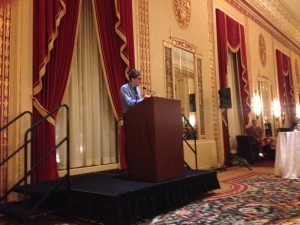 Finally, in case you haven’t heard, the 2014 National Translation Award went to Eugene Ostashevsky and Matvei Yankelevich for their collaborative translation of An Invitation for Me To Think by Alexander Vvedensky. Eugene is in Berlin for the year, so the award was accepted by Matvei, who read and spoke about several brief but hilarious passages from Vvedensky’s poems. The Lucien Stryk Prize was awarded to Jonathan Chaves.
Finally, in case you haven’t heard, the 2014 National Translation Award went to Eugene Ostashevsky and Matvei Yankelevich for their collaborative translation of An Invitation for Me To Think by Alexander Vvedensky. Eugene is in Berlin for the year, so the award was accepted by Matvei, who read and spoke about several brief but hilarious passages from Vvedensky’s poems. The Lucien Stryk Prize was awarded to Jonathan Chaves.
The post What I Learned at ALTA 2014 appeared first on TRANSLATIONiSTA.
Susan Bernofsky's Blog
- Susan Bernofsky's profile
- 62 followers



